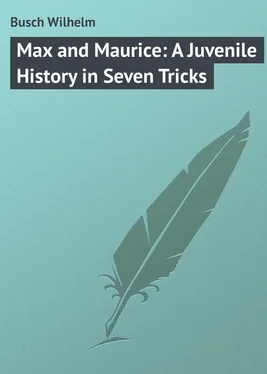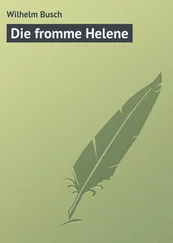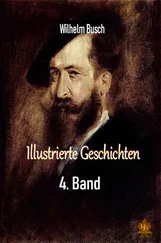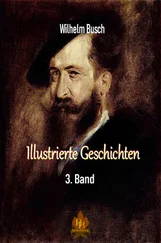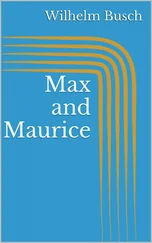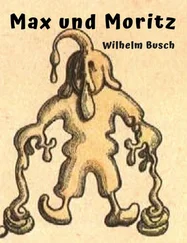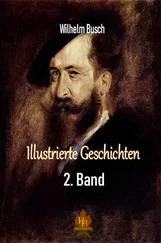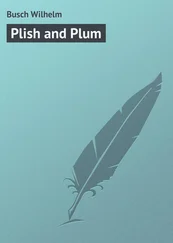Busch Wilhelm
Max and Maurice: A Juvenile History in Seven Tricks
Ah, how oft we read or hear of
Boys we almost stand in fear of!
For example, take these stories
Of two youths, named Max and Maurice,
Who, instead of early turning
Their young minds to useful learning,
Often leered with horrid features
At their lessons and their teachers.
Look now at the empty head: he
Is for mischief always ready.
Teasing creatures, climbing fences,
Stealing apples, pears, and quinces,
Is, of course, a deal more pleasant,
And far easier for the present,
Than to sit in schools or churches,
Fixed like roosters on their perches.
But O dear, O dear, O deary,
When the end comes sad and dreary!
'Tis a dreadful thing to tell
That on Max and Maurice fell!
All they did this book rehearses,
Both in pictures and in verses.
To most people who have leisure
Raising poultry gives great pleasure
First, because the eggs they lay us
For the care we take repay us;
Secondly, that now and then
We can dine on roasted hen;
Thirdly, of the hen's and goose's
Feathers men make various uses.
Some folks like to rest their heads
In the night on feather beds.
One of these was Widow Tibbets,
Whom the cut you see exhibits.
Hens were hers in number three,
And a cock of majesty.
Max and Maurice took a view;
Fell to thinking what to do.
One, two, three! as soon as said,
They have sliced a loaf of bread,
Cut each piece again in four,
Each a finger thick, no more.
These to two cross-threads they tie,
Like a letter X they lie
In the widow's yard, with care
Stretched by those two rascals there.
Scarce the cock had seen the sight,
When he up and crew with might:
Cock-a-doodle-doodle-doo; —
Tack, tack, tack, the trio flew.
Cock and hens, like fowls unfed,
Gobbled each a piece of bread;
But they found, on taking thought,
Each of them was badly caught.
Every way they pull and twitch,
This strange cat's-cradle to unhitch;
Up into the air they fly,
Jiminee, O Jimini!
On a tree behold them dangling,
In the agony of strangling!
And their necks grow long and longer,
And their groans grow strong and stronger.
Each lays quickly one egg more,
Then they cross to th' other shore.
Widow Tibbets in her chamber,
By these death-cries waked from slumber,
Rushes out with bodeful thought:
Heavens! what sight her vision caught!
From her eyes the tears are streaming:
"Oh, my cares, my toil, my dreaming!
Ah, life's fairest hope," says she,
"Hangs upon that apple-tree."
Heart-sick (you may well suppose),
For the carving-knife she goes;
Cuts the bodies from the bough,
Hanging cold and lifeless now
And in silence, bathed in tears,
Through her house-door disappears.
This was the bad boys' first trick,
But the second follows quick.
When the worthy Widow Tibbets
(Whom the cut below exhibits)
Had recovered, on the morrow,
From the dreadful shock of sorrow,
She (as soon as grief would let her
Think) began to think 'twere better
Just to take the dead, the dear ones
(Who in life were walking here once),
And in a still noonday hour
Them, well roasted, to devour.
True, it did seem almost wicked,
When they lay so bare and naked,
Picked, and singed before the blaze, —
They that once in happier days,
In the yard or garden ground,
All day long went scratching round.
Ah! Frau Tibbets wept anew,
And poor Spitz was with her, too.
Max and Maurice smelt the savor.
"Climb the roof!" cried each young shaver.
Through the chimney now, with pleasure,
They behold the tempting treasure,
Headless, in the pan there, lying,
Hissing, browning, steaming, frying.
At that moment down the cellar
(Dreaming not what soon befell her)
Конец ознакомительного фрагмента.
Текст предоставлен ООО «ЛитРес».
Прочитайте эту книгу целиком, купив полную легальную версию на ЛитРес.
Безопасно оплатить книгу можно банковской картой Visa, MasterCard, Maestro, со счета мобильного телефона, с платежного терминала, в салоне МТС или Связной, через PayPal, WebMoney, Яндекс.Деньги, QIWI Кошелек, бонусными картами или другим удобным Вам способом.
